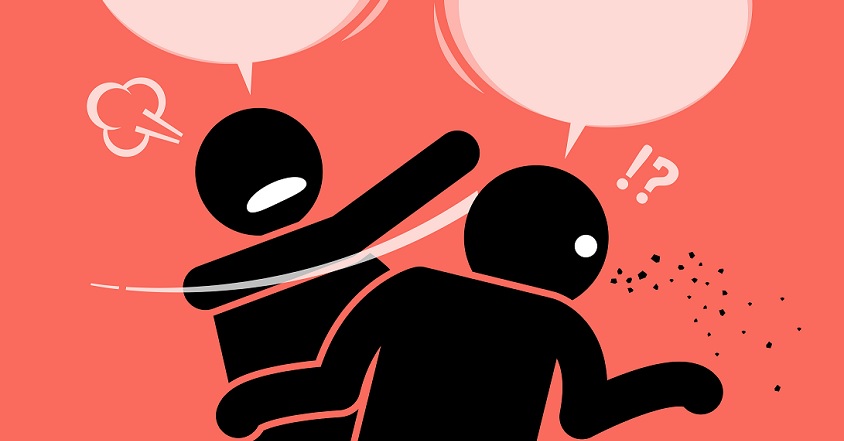
Article by Lorraine McCarthy and Introduction by Melissa Jones
INTRODUCTION: In recent times, much has been made of high profile individuals lashing out against others, whether this be at award ceremonies like the Oscars, on tennis courts or in parliament. The reaction of the community to these events have ranged from condemnation of the outbursts to defending the person who lashed out referencing the pressure they are under, the provocation they faced in the situation and at times the impact of their childhood. You cannot talk yourself out of bad behaviour. Any form of lashing out or violence is not acceptable. We know this, it can never be the right response in any relationship.
However, these situations also prompt us to think
about what triggers such reactions and how it is that at times human beings can
lead with ‘fight’ rather than a constructive reaction. Delving into a person’s
upbringing and the legacy of it, often shines a light on an unhealthy
self-monologue that masks the true impact of an incomprehensible trauma. Not
all people react the same way in similar upbringings, and that is a point worth
denoting.
In the article below, Human Synergistics, Counsellor, Facilitator and Coach Lorraine McCarthy deep dives into the Power Style that often dictates people who have not dealt with the emotional lacerations of their past, and that their coping mechanisms can sometimes be a response to
historical hurts and fears that need to be acknowledged, confronted and actioned.
ARTCLE by Lorraine McCarthy
Power Style is about being in control. Those who have been in Foundation Workshops with me have heard me speak of my own journey with it. It showed itself in my LSI 1 feedback in 1981 soon after my first two children aged 20 months and four months, had died of a hereditary liver disease.
When I saw the red extension during my debrief with Clay Lafferty I felt quite upset. I said to him something like, 'that's terrible - I don't want to be that way' and he replied, 'it's not terrible, it just reflects that you have had some hard things to deal with'. His compassion was very consoling to me and I have never forgotten it. When I see it in others' profiles I also feel a compassion for the person who has described themselves in this way.

I kept my Power Style for a long time afterwards however, not knowing how to do without it. The feeling of being in control made me feel safe and able to achieve anything - by sheer determination and by myself. It was my primary coping style, resourcing me to have the courage to defy the odds and have two more children. Eventually I was confronted with my ability to 'get angry easily', and the effect this had on others and knew I would have to find a way of changing. I believe that when we are ready for change and have that felt need to act, the understanding and the way will come to us. I learned rapidly: that anger is not the first thing we feel. Rather it is a response to hurt and fear: that it was not the deaths of my children that had produced the Power Style but that I had learned it in my first five to seven years of life and slipped into it when times were hard. These two things I explored over a two year period of counselling. My new awareness was that I was worthwhile, that I deserved compassion from myself not relentless urging to be in control no matter what.
When I came to write about this style I thought it would be easy as I have known it so well. In fact it has been the most difficult so far. When I read through the items I was somewhat horrified. Surely I could not have described myself in those terms. There was only one I could readily give myself a 2 for: 'runs things by self'. This has a big cost. It wears me out. Why would I do this to myself? Another I could give myself a 1 for is 'bossy', because my family tells me I am, and unwillingly, in the spirit of honesty I could give myself a 1 for 'needs to control others'. Because so many of the items in Power are socially undesirable the norming structure means that it doesn't take much to create an extension. The four I would have gained from the items above would take it out to the 50th percentile.
In looking at the items in terms of how I might have scored myself in 1981 I could possibly have chosen 'resists suggestions made by others', 'little confidence in people', 'dogmatic and rigid', 'easily offended', 'critical of others', 'argumentative' and 'dominating'. Wow! Not great for others to be on the receiving end. How sad for Lorraine. Believing that she had to do everything and do it on her own. Exhausted and isolated.
Power Style represents a 'hostile and aggressive' way to treat ourselves. It leaves little room for creative possibilities and enjoyment. It ignores our innate worth. Why would we do it?
In essence it is a coping style that helps us think we are dealing with what is happening to us. But like all coping styles it doesn't actually deal with the issue. It masks the issue. The cost to oneself is frustration, anger, lack of acceptance of others and lack of acceptance of self.
----------------
About the Author:
Lorraine is a highly experienced counsellor, coach and facilitator. She spent many years working as a teacher and counsellor in secondary schools in New Zealand before moving into private practice, then ultimately joining Human Synergistics Australia as part of their consulting and training team. She is considered a global expert in working with the Life Styles Inventory™ (LSI) to help leader’s become more effective in their roles and more fulfilled in their personal lives.
Her focus is on empowering individuals. Over her 20+ years of experience Lorraine has become widely recognised for her use of psychodrama in her counselling approach, to enable people to revisit their past. She is passionate in her efforts to help individuals see their intrinsic value, understand what might have led them to believe their value was dependent on others or tasks, and develop a relationship with themselves that is compassionate and loving. History can be rewritten. Anchored in a belief in one’s own creative potential, anything is possible.
Lorraine has a Masters in Counselling and the highest level membership of ACA and NZAC. She lives in New Zealand, splitting her time between her career and being an active mother and grandmother.